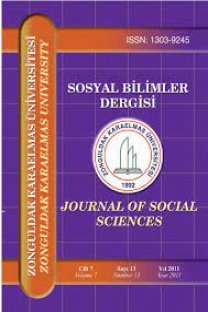Türkiye'de 2001 yılı sonrası yasal ve kurumsal reformların ekonomi üzerindeki etkisi
Bu çalışmada 1980 sonrası dönem için, Türkiye’de 2001 krizi sonrası alınan istikrar tedbirleri sonrasında gerçekleştirilen yasal ve kurumsal düzenlemelerin ekonomiye etkisi incelenmiştir. Yasal ve kurumsal reformların hız kazandığı 2001 yılı sonrası ve öncesi dönemde, sanayi üretim endeksi, enflasyon, para arzı ve dolaşımdaki para değişkenlerinin seyrinde yapısal bir kırılma olup olmadığının belirlenmesi amacıyla yapay değişken tanımlanmış ve otoregresif model kullanılarak test edilmiştir. Analiz sonuçlarına göre, 2001 yılı sonrası dönemde makroekonomik göstergelerde önceki döneme kıyasla anlamlı bir iyileşme olduğu tespit edilmiştir.
The impact of legal and institutional reforms on Turkish economy after 2001
In this study, the impact of legal and institutional regulations, which are put into effect after the stabilization measures of the 2001 crisis, on the economy is examined for the post-1980 period. A dummy variable is defined to determine whether or not there is a structural break for the variables of industrial production index, inflation, money supply and the money in circulation in the pre-2001 and post-2001 periods that legal and institutional reforms have been quickly progressed and this dummy variable is tested through the autoregressive model. According to the analysis results, it is determined that in the post-2001 period there is a significant progress in the macroeconomic indicators compared to the previous period.
___
- Acemoğlu, Daron, Simon Johnson and James Robinson (2004), “Institutions As The Fundamental Cause of Long-Run Growth”, NBER Working Paper Series 10481, http://www.nber.org/papers/w10481 (02.08.2009).
- Acemoğlu, Daron and Root Causes (2003), “A Historical Approach to Assessing the Role of Institutions in Economic Development”, Finance and Development, June, pp.27-30.
- Alesina, Alberto and Nouriel Roubini (1990), "Political Cycle in OECD Economies", NBER Working Paper Series 3478, National Bureau of Economic Research.
- Alesina, Alberto, Gerald D. Cohen and Nouriel Roubini (1993), “Electoral Business Cycle in Industrial Democracies”, European Journal of Political Economy, 9, pp.1-23.
- Alesina, Alberto, Şule Özler, Nouriel Roubini and Phillip Swagel (1996), “Political Instability and Economic Growth”, Journal of Economic Growth, 1(2), pp. 189- 211.
- Ali, Abdiweli M. (1997), “Economic Freedom, Democracy and Growth”, Journal of Private Enterprise, 3: pp.1-20.
- Bera, Anil and Carlos Jarque (1981), Efficient est for normality, heterosedasticity and serial indepence of regression residuals: Monte Carlo evidence. Economics Letter, 7, pp.313-318.
- Brooks, Chris (2002), Introductory Econometrics for Finance, Cambridge: Cambridge University.
- Cukierman, Alex, Steven B. Webb and Bilin Neyapti (1992), “Measuring the Independence of Central Banks and Its Effect on Policy Outcomes”, The World Bank Economic Review, Vol. 6 No: 3, pp.353-398.
- Dawson, John W. (1998), “Institutions, Investment and Growth: New Cross-Country and Panel Data Evidence”, Economic Inquiry, 2: pp.603-19.
- Dickey, David A. and Wayne A. Fuller (1979), “Distribution of the Estimators for Autoregressive Time Series with a Unit Root,” Journal of the American Statistical Association, 74, pp. 427–431.
- Easton, Stephen T. and Michal.A. Walker (1997), “Income, Growth, and Economic Freedom”, American Economic Review, 328-32.
- Eggertsson, Thrainn (1998), “Neoinstitutional Economics”, The New Polgrove Dictionary of Economics and The Law, 2, pp.665-671.
- Godfrey, Leslie George (1988), Spesicification Test in Econometrics, Cambridge, UK: Cambridge.
- Gökalp, M. Faysal ve Ercan Baldemir (2006), “Kurumsal Yapı ve Ekonomik Büyüme İlişkisi”, Dokuz Eylül Üniversitesi SBE Dergisi, 8 (1), ss.212-226.
- Jahjah, Samir (2000), “Inflation, Debt and Default in a Monetary Union”, IMF Working Paper 2000/179, Washington.
- Karakayalı, Hüseyin ve Halit Yanıkkaya (2003), “Kurumsal Faktörlerin Ekonomik Büyümeye Etkileri”, http://www.ceterisparibus.net/makro.htm, (22.08.2009).
- Kasper, Wolfgang and Manfred E.Streit (1988), “Institutional Economics, Social Order and Public Policy”, The Locke Institute, Cheltenham, Edward Elgar, pp.27-91.
- May, A. Mari (1987), “The Political Business Cycles: An Institutional Critique and Reconstruction”, Journal of Economic Issues, 21 (2), pp.713-722.
- North, Douglas (2002), Institutions, Institutional Change and Economic Performance, Cambridge: Cambridge University Pres, (Çev Gül Çağalı Güven, Kurumlar, Kurumsal Değişim ve Ekonomik Performans), Sabancı Üniversitesi Yayınları, İstanbul.
- North, Douglas and Robert Paul Thomas (1970), “An Economic Theory of the Growth of the Western World”, The Economic History Review, 23(1), pp. 1-17.
- Onur, Sara (2005), “Finansal Liberalizasyon ve GSMH Büyümesi Arasındaki ilişki”, ZKÜ Sosyal Bilimler Dergisi, Cilt 1, Sayı 1, s.127-152.
- Spindler, Zane A. (1991), “Liberty and Development: A Further Empirical Perspective”, Public Choice, 69(2), pp.197–210.
- Sturm, Jan-Egbert and Jakob De Hann (2001), "Inflation in Devoloping Countries: Does Central Bank Indepedence Matter? New Evidence Based on A New Data Set", Ifo Studien, 47(4), pp.389-403.
- Vural, Burçak Müge (2007), “Kurumsal Koordinasyonun Ekonomik Büyümeye Etkileri”, İşletme Fakültesi Dergisi, Cilt 8, Sayı 1, ss.1-29.
- Yapraklı, Sevda (2008), Kurumsal Yapının Ekonomik Büyümeye Etkisi: Üst Orta Gelir Düzeyindeki Ülkeler Üzerine Bir Uygulama”, Ege Akademik Bakış / Ege Academic Review, 8(1), ss. 301-307.
- ISSN: 1303-9245
- Yayın Aralığı: Yıllık
- Başlangıç: 2018
- Yayıncı: -
Sayıdaki Diğer Makaleler
Dünya petrol fiyatlarındaki değişimin büyüme ve enflasyon üzerindeki etkisi: Türkiye örneği
Kobi'lerde finansal performansı belirleyen faktörler
Konaklama işletmelerinde çalışanların iş tatmininin ölçülmesi üzerine bir araştırma
Urfa'da tanzimat'a geçiş sürecinde idari ve mali yapı
Bretton woods kuruluşlarının yoksullukla mücadele yaklaşımları ve stratejileri
Türkiye'de 2001 yılı sonrası yasal ve kurumsal reformların ekonomi üzerindeki etkisi
Büyük işletmeler devleti: kuruluş dönemi Ameriken ekonomik büyümesinde siyasi yapının rolü
